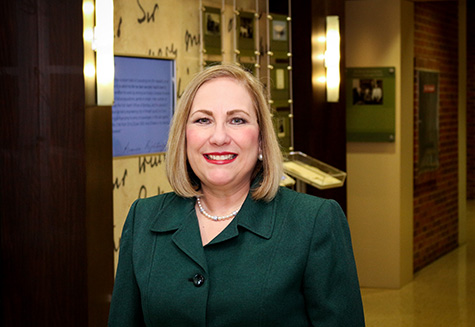 Maria Shirey, Ph.D.The University of Alabama at Birmingham School of Nursing has received a four-year, $2.8 million grant to help improve health outcomes in medically underserved areas in Alabama and to educate undergraduate nursing students and practicing registered nurses in team-focused primary care.
Maria Shirey, Ph.D.The University of Alabama at Birmingham School of Nursing has received a four-year, $2.8 million grant to help improve health outcomes in medically underserved areas in Alabama and to educate undergraduate nursing students and practicing registered nurses in team-focused primary care.
The project, “Building a Resilient Primary Care Registered Nurse Workforce for Chronic Disease Prevention and Control in Alabama,” is funded by a Nurse Education, Practice, Quality and Retention grant from the U.S. Department of Health and Human Services Health Resources and Services Administration and will focus on training and sustaining baccalaureate-prepared registered nurses in medically underserved areas.
Maria Shirey, Ph.D., the project’s principal investigator, professor and chair of the Department of Acute, Chronic and Continuing Care, says the role of the BSN-prepared RN is integral to care coordination and management of patient transitions from hospital to home. However, over the past several decades, registered nurses have disappeared from most community-based primary care settings, often replaced by less trained medical assistants. When registered nurses are found in primary care settings, they often are limited to triaging phone calls and walk-ins and not practicing to the full extent of their education and training.
“Alabama and the United States have a primary care service deficit, especially in medically underserved areas, and BSN-prepared registered nurses are capable of assuming greater responsibility for care management for patients with chronic conditions across all levels of prevention, as well as follow-up and complex specialty care coordination for those discharged from the hospital,” Shirey said. “BSN-prepared registered nurses can provide safe, high-quality care to at-risk populations, such as patients with multiple chronic conditions, while also managing the costs of such care.”
The project also builds on the UAB School of Nursing’s expertise in interprofessional collaborative practice and education for community-based chronic disease management of individuals with complex medical conditions.
It will create a nurse-led primary care hub with six community partners throughout Alabama, expanding existing and creating new academic-practice partnerships in medically underserved areas in Jefferson, Etowah and Macon counties. This will be accomplished through the UAB School of Nursing nurse-managed PATH Clinic for diabetes, HRTSA Clinic for heart failure and Bessemer Neighborhood Health Clinic, as well as the Jefferson County Department of Health, Macon County Department of Health and East Central Alabama Area Health Education Center.
 Constance Smith Hendricks, Ph.D.The sites will serve as clinical training locations for BSN students focusing on primary care nursing with an emphasis on chronic disease prevention and control in diabetes, high blood pressure, mental health and substance abuse. In Macon County, the school is joining forces with the Tuskegee University School of Nursing and Allied Health as an affiliate partner.
Constance Smith Hendricks, Ph.D.The sites will serve as clinical training locations for BSN students focusing on primary care nursing with an emphasis on chronic disease prevention and control in diabetes, high blood pressure, mental health and substance abuse. In Macon County, the school is joining forces with the Tuskegee University School of Nursing and Allied Health as an affiliate partner.
“We wanted Tuskegee as an affiliate partner due to our longstanding informal relationship and synergy across our respective visions and missions,” Shirey said. “This affiliate partnership also provides a unique opportunity to address health disparities in the Black Belt area of the state by educating nurses who plan to stay in their communities. In educating undergraduate nursing students and practicing registered nurses in team-focused primary care, together UAB and Tuskegee will contribute toward the national call for registered nurses to work as partners in transforming primary care.”
Tuskegee faculty will participate, and 12 Tuskegee BSN students will be among the 60 students expected to graduate as R.N. Primary Care Scholars across the four-year project.
Tuskegee University School of Nursing and Allied Health Dean Constance Smith Hendricks, Ph.D., R.N., says Tuskegee has a rich history of nursing education as the state’s first baccalaureate nursing program and its graduates are dedicated to the health of Alabamians through their significant contributions to nursing and health care. The affiliate partnership with the UAB School of Nursing strengthens both schools’ collective ability to contribute toward the national call for registered nurses to work as partners in transforming primary care. Smith Hendricks is a former faculty member and Distinguished Alumna of the UAB School of Nursing, earning a bachelor’s degree from the school in 1974 and a master’s degree in 1981.
“Tuskegee University Nursing is honored to have the opportunity to be a partner in this very needed initiative,” Smith Hendricks said. “Our graduates will be the beneficiaries of this unique opportunity to become RNPC Scholars and gain additional skills and knowledge to better serve those in our Black Belt communities with chronic health care needs alongside the UABSON student RNPC scholars.”
The program is open to senior undergraduate BSN or RN-to-BSN students with a cumulative GPA of 3.0 or greater and a faculty recommendation.
For more, visit the School of Nursing website.